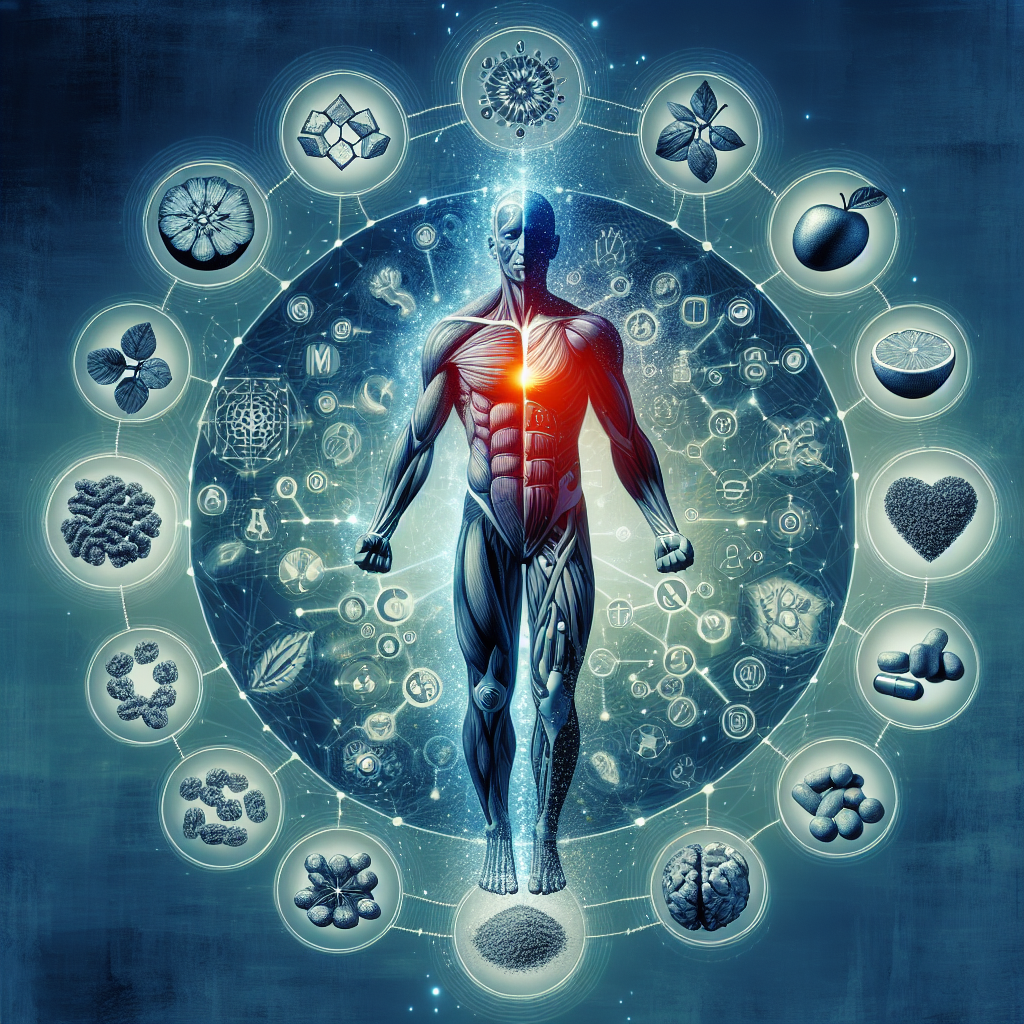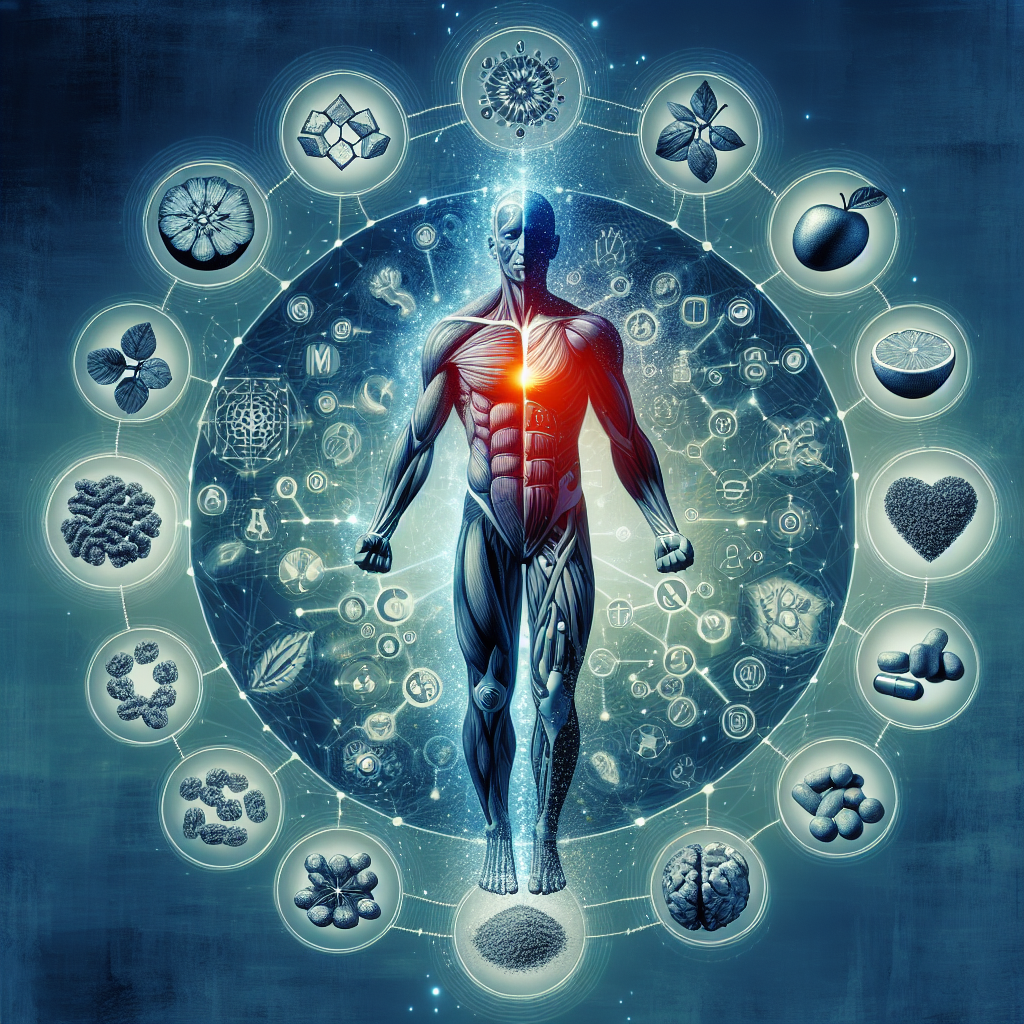In today’s fast-paced and demanding world, maintaining a healthy lifestyle has become increasingly important. That’s why we are here to shed light on the power of proper nutrition. Through our website, we aim to provide valuable insights and knowledge about the role nutrition plays in our overall well-being. Whether you’re looking to enhance your physical performance, manage weight, prevent diseases, or simply improve your energy levels, understanding the impact of nutrition on our bodies is crucial. With a focus on health and wellness, our website will be a reliable source for information and recommendations, eventually paving the way for affiliate marketing opportunities. Join us on this journey towards a healthier and more vibrant life.

Importance of Proper Nutrition
Proper nutrition plays a crucial role in maintaining overall health and well-being. The foods we consume impact our physical and mental health in more ways than we realize. A well-balanced diet provides us with essential nutrients, vitamins, and minerals that our bodies need to function optimally. By fueling our bodies with the right nutrients, we can enhance our energy levels, prevent diseases, and even support our mental health.
Impact on overall health
Proper nutrition is the foundation of good health. When we provide our bodies with a wide variety of nutrient-dense foods, we promote optimal functioning of our bodily systems. Nutrient deficiencies can lead to a weakened immune system, impaired organ function, and increased susceptibility to diseases and infections. A poor diet lacking in essential nutrients can also contribute to the development of chronic conditions such as cardiovascular disease, diabetes, and obesity.
Effect on energy levels
The food we consume serves as the fuel for our bodies. By choosing nutrient-rich foods, we can sustain consistent energy levels throughout the day. Carbohydrates, proteins, and fats are the three macronutrients that provide our bodies with energy. Carbohydrates are our primary source of fuel and should make up a significant portion of our daily caloric intake. Proteins help build and repair tissues, while fats provide a concentrated source of energy. By including all three macronutrients in our diet, we can maintain steady energy levels and improve overall productivity.
Role in disease prevention
Proper nutrition is key to preventing a wide range of diseases and conditions. Consuming a diet rich in fruits, vegetables, whole grains, and lean proteins can help reduce the risk of chronic diseases such as heart disease, cancer, and diabetes. Fruits and vegetables are packed with antioxidants and phytochemicals that scavenge harmful free radicals and protect our cells from damage. Additionally, a well-balanced diet promotes a healthy weight, which is crucial in reducing the risk of obesity-related illnesses. By prioritizing proper nutrition, we can take proactive steps in maintaining our long-term health.
Understanding Macronutrients
Macronutrients are the essential nutrients required by our bodies in large quantities to support various bodily functions. They provide energy and are essential for growth, repair, and regulation of body processes. The three main macronutrients are proteins, carbohydrates, and fats.
Proteins
Proteins are the building blocks of our bodies. They are crucial for the growth, repair, and maintenance of tissues such as muscles, skin, and organs. Proteins are also involved in the production of enzymes, hormones, and antibodies. Good sources of protein include lean meats, poultry, fish, legumes, nuts, and dairy products.
Carbohydrates
Carbohydrates are the body’s primary source of energy. They are broken down into glucose, which is used by our cells to produce energy. Complex carbohydrates, such as whole grains and vegetables, provide a slow and steady release of energy, while simple carbohydrates, such as sugars and refined grains, provide a quick boost of energy. It is important to choose carbohydrates that are high in fiber and low in added sugars to support optimal health.
Fats
Fats are essential for the absorption of fat-soluble vitamins, insulation of organs, and the production of hormones. They also provide a concentrated source of energy. It is important to include healthy fats, such as monounsaturated and polyunsaturated fats, in our diet. These can be found in foods like avocados, nuts, seeds, and fatty fish. Saturated and trans fats should be limited, as they can increase the risk of heart disease and other chronic conditions.
Micronutrients and Their Functions
While macronutrients provide energy, micronutrients are necessary in smaller amounts to support various biochemical processes in our bodies. Micronutrients include vitamins, minerals, and phytochemicals.
Vitamins
Vitamins are organic compounds that are essential for the proper functioning of our bodies. They are responsible for supporting growth, immune function, and cell repair, among other functions. There are two types of vitamins: water-soluble vitamins (B vitamins and vitamin C) and fat-soluble vitamins (vitamins A, D, E, and K). It is important to consume a variety of foods to ensure an adequate intake of vitamins.
Minerals
Minerals are inorganic substances that are necessary for the proper functioning of our bodies. They play a critical role in maintaining fluid balance, nerve function, muscle contraction, and bone health. Common minerals include calcium, iron, magnesium, potassium, and zinc. Consuming a varied diet that includes fruits, vegetables, whole grains, and lean proteins can help ensure we meet our mineral needs.
Phytochemicals
Phytochemicals are compounds found in plants that have been shown to have potential health benefits. They act as antioxidants, anti-inflammatory agents, and may even have anti-cancer properties. Examples of phytochemicals include resveratrol in grapes and berries, lycopene in tomatoes, and curcumin in turmeric. Including a wide variety of fruits, vegetables, herbs, and spices in our diet can expose us to a range of phytochemicals.
Eating a Balanced Diet
Eating a balanced diet is essential for meeting our nutritional needs and maintaining optimal health. A balanced diet involves consuming the right proportions of macronutrients and micronutrients from a variety of food sources.
Determining portion sizes
Understanding portion sizes is crucial for maintaining a balanced diet. It is important to be mindful of our portions to avoid overeating and to ensure we are meeting our nutrient needs without consuming excess calories. Using measuring cups, food scales, or visual cues can help us determine appropriate portion sizes for different food groups.
Food groups
A balanced diet includes foods from all major food groups: fruits, vegetables, grains, protein sources, and dairy or dairy alternatives. Each food group provides essential nutrients, vitamins, and minerals that our bodies need. By including a variety of foods from each group, we can ensure we are getting a wide range of nutrients.
Meal planning
Meal planning is an effective strategy to ensure a balanced diet. By planning our meals and snacks in advance, we can make healthier choices and avoid relying on convenience foods that are often high in fat, sugar, and sodium. We can also ensure we are incorporating a variety of food groups into our meals, making it easier to meet our nutritional needs.

The Role of Water in Nutrition
Water is often overlooked, but it is essential for good nutrition and overall health. Staying properly hydrated is crucial for the proper functioning of our bodies.
Benefits of hydration
Hydration is important for maintaining fluid balance, regulating body temperature, and supporting digestion. Water is involved in virtually every bodily process, including transporting nutrients, removing waste products, and lubricating joints. Proper hydration also improves cognitive function, helps control appetite, and promotes healthy skin.
Recommended water intake
The exact amount of water needed varies depending on factors such as age, sex, activity level, and climate. However, a general recommendation is to consume at least 8 glasses (64 ounces) of water per day. It is important to listen to our bodies and drink water when we feel thirsty. Additionally, factors such as physical activity, illness, and pregnancy may require increased water intake.
The Influence of Nutrition on Mental Health
Proper nutrition not only impacts our physical health but also plays a significant role in our mental well-being.
Nutrient deficiencies and mental health
Nutrient deficiencies can have a profound impact on mental health. For example, deficiencies in vitamins B12, B6, and folate have been linked to an increased risk of depression and anxiety. Omega-3 fatty acids, found in fatty fish and flaxseeds, have been shown to support brain health and reduce the risk of mental health disorders. Ensuring we consume a well-rounded diet that includes a variety of nutrient-dense foods can help prevent nutrient deficiencies and support mental well-being.
Effects of a healthy diet on mood and cognition
Consuming a healthy diet has been associated with improved mood and cognitive function. Diets high in fruits, vegetables, whole grains, lean proteins, and healthy fats have been linked to a lower risk of depression and improved overall mental well-being. On the other hand, diets high in processed foods, unhealthy fats, and added sugars have been associated with an increased risk of depression and cognitive decline. Choosing nutrient-dense foods can positively impact our mood, memory, and concentration.
The Connection Between Nutrition and Exercise
Nutrition plays a crucial role in supporting exercise performance, energy levels, and post-workout recovery.
Pre-workout fuel
Eating the right foods before exercise can provide the energy needed for optimal performance. Carbohydrates are the body’s preferred fuel source during exercise, so consuming a meal or snack high in carbohydrates before a workout can help maintain energy levels. Additionally, including a moderate amount of protein can support muscle repair and growth. Examples of pre-workout snacks include a banana with peanut butter, yogurt with berries, or a whole grain wrap with lean protein.
Post-workout recovery
After exercise, it is important to replenish the nutrients and fluids lost during physical activity. Consuming a combination of carbohydrates and protein within 30 minutes to an hour after exercise can help enhance muscle recovery and glycogen replenishment. Good post-workout snacks include a protein shake, Greek yogurt with granola, or a turkey and avocado sandwich on whole grain bread.
Recommended supplements
While obtaining nutrients from whole foods should always be the priority, certain supplements can support exercise performance and recovery. For example, athletes may benefit from supplementation with creatine, which can enhance strength and power output. Omega-3 fatty acids and vitamin D supplements may also be beneficial, especially for individuals with limited exposure to sunlight. However, it is important to consult with a healthcare professional before starting any supplementation regimen.
Addressing Common Nutrition Myths
There are numerous nutrition myths that can lead to confusion about what constitutes a healthy diet. Here are three common myths debunked:
Low-fat or low-carb diet?
The myth that either low-fat or low-carb diets are superior for weight loss has been widely debunked. The truth is, both macronutrients have a place in a healthy diet. Instead of focusing on extremes, it is important to choose quality fats and carbohydrates. Opt for sources of healthy fats, such as avocados, nuts, and olive oil, and choose whole grains over refined carbohydrates.
Eating after 6 PM
Contrary to popular belief, eating after 6 PM does not automatically lead to weight gain. It is the total amount of calories consumed throughout the day that matters most for weight management. The timing of meals and snacks is less important than the overall balance of nutrients and portion sizes. It is important to listen to our bodies’ hunger and fullness cues and to make healthy choices regardless of the time of day.
Negative effects of sugar
While excessive consumption of added sugars can have negative health effects, dietary sugar in moderation is not inherently harmful. The key is to consume added sugars in moderation and to prioritize natural sources of sugar found in fruits, vegetables, and dairy products. By focusing on a balanced diet and limiting added sugars, we can enjoy a variety of foods without compromising our health.
Nutrition for Specific Life Stages
Nutritional needs vary at different stages of life. Here are some key considerations for specific life stages:
Pregnancy and breastfeeding
During pregnancy and breastfeeding, the body requires additional nutrients to support the mother’s health and the growth and development of the baby. It is important to consume a well-balanced diet rich in folic acid, iron, calcium, and omega-3 fatty acids. Prenatal supplements may also be recommended to ensure adequate nutrient intake.
Childhood and adolescence
Proper nutrition is critical during childhood and adolescence to support growth and development. A diet rich in fruits, vegetables, whole grains, lean proteins, and dairy products is essential. It is important to set a good example by promoting healthy eating habits and encouraging regular physical activity.
Aging and senior years
Nutritional needs change as we age, and it is important to adapt our diet to support overall health and wellbeing. Older adults may require fewer calories but need adequate protein, vitamins, and minerals to maintain muscle mass, bone health, and cognitive function. It is essential to focus on nutrient-dense foods and ensure adequate hydration.
Tips for Healthy Eating on a Budget
Eating a healthy diet does not have to break the bank. Here are some tips for maintaining a nutritious diet on a budget:
Meal planning and budgeting
Plan meals in advance to avoid impulse purchases and minimize food waste. Make a grocery list and stick to it, focusing on nutrient-dense foods that provide the most bang for your buck. Buying in bulk and utilizing leftovers creatively can also help stretch your budget.
Shopping smartly
When grocery shopping, compare prices, and choose store brands or generic options when available. Buying fruits and vegetables that are in season can often be more affordable. Look for sales, discounts, and coupons to save money on staple items.
Cooking at home
Cooking meals at home is not only cost-effective but also allows you to have control over the ingredients and portion sizes. Experiment with budget-friendly recipes and bulk cooking to save time and money. Consider packing homemade lunches and snacks instead of relying on costly convenience foods.
In conclusion, proper nutrition is of utmost importance for our overall health and well-being. It impacts our physical health, energy levels, disease prevention, mental health, exercise performance, and various life stages. By understanding the role of macronutrients, micronutrients, and water in our diet, and by debunking common nutrition myths, we can make informed choices and prioritize a balanced diet. Implementing tips for healthy eating on a budget can ensure that proper nutrition is accessible for everyone. Remember, proper nutrition is a lifelong commitment to our health and happiness.

